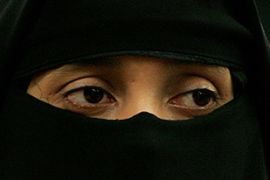Netherlands moves to ban burqa
Dutch government cites ‘security reasons’ for seeking to ban the burqa in public.

Existing legislation in the Netherlands already limits the wearing of burqas and other total face-coverings on public transport or in schools.
|
“The fuss is much bigger than the number of people concerned” Job Cohen, mayor of Amsterdam |
He also said that the security argument did not stand up, adding: “I do not think people who have bad things in their minds would wear a burqa.”
The campaign has focused so far on issues like the economy rather than immigration because most mainstream parties have hardened their stances in recent years.
Last December Dutch lawmakers voted in favour of a proposal by far-right politician Geert Wilders to outlaw face-coverings and asked Verdonk to examine the feasibility of such a ban.
Because veils were worn for religious reasons, Verdonk had feared new legislation could come into conflict with religious freedom laws. But she said on Friday that this was not the case.
France has banned the Muslim headscarf and other religious garb from state schools while discussion in Britain centres on limiting the full facial veil or niqab.
‘Victimised and alienated’
Italy has a decades-old law against covering the face in public as an anti-terrorism measure. Some politicians have called for this rule to be enforced against veiled Muslim women.
Dutch Muslim groups have complained that a burqa ban would make the country’s one million Muslims feel more victimised and alienated, regardless of whether they approve of burqas or not.
“This will just lead to more girls saying ‘Hey, I’m also going to wear a burqa as a protest’,” Naima Azough, a member of parliament from the opposition Green Left, told an election campaign meeting for fellow members of the Moroccan community.
Job Cohen, the Labour mayor of Amsterdam, said he opposed burqas in schools and public buildings, and said women wearing one who failed to get a job should not expect welfare benefits.
“From the perspective of integration and communication, it is obviously very bad because you can’t see each other so the fewer the better,” he told foreign journalists.
“But actually hardly anybody wears one … The fuss is much bigger than the number of people concerned.”
Since the murder of anti-immigration politician Pim Fortuyn in 2002, the Dutch have lost a reputation for tolerance, pushing through some of Europe‘s toughest entry and integration laws.
Social and religious tensions have escalated in the last few years, exacerbated by the murder of film director and Islam critic Theo van Gogh by a Dutch-Moroccan Muslim man in 2004.